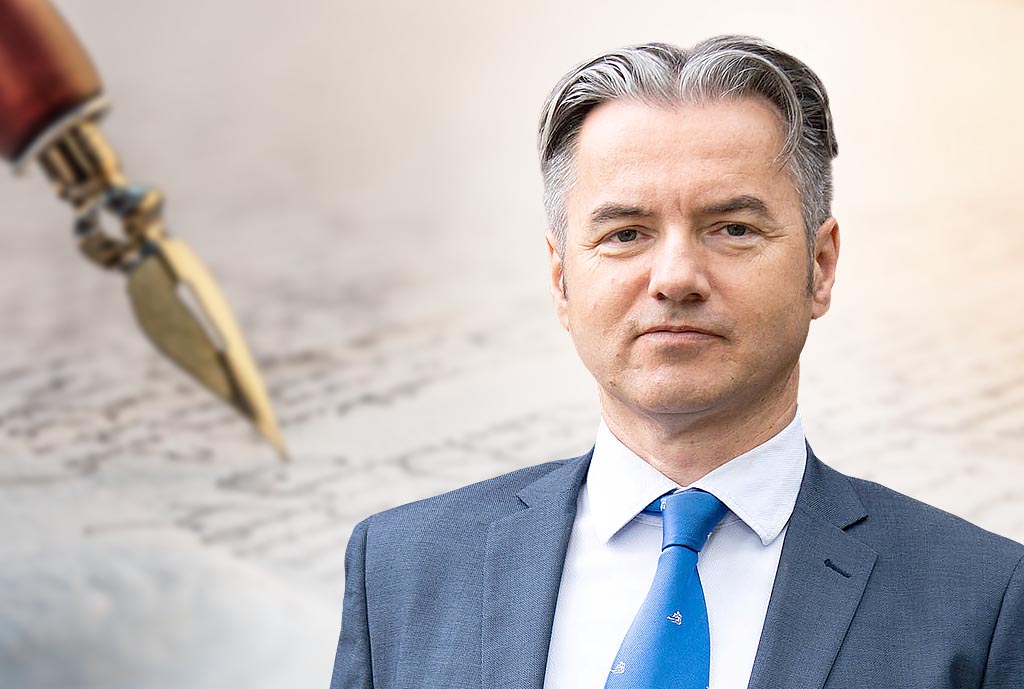By: Dr Metod Berlec
On the cover of this issue of Demokracija Magazine is Jorge Mario Bergoglio, or Pope Francis, who marked the tenth anniversary of his pontificate in the year 2023.
He is the first pope from Latin America and the first non-European pope since the beginning of the new era. The Roman bishop with a globalist agenda is perceived differently by people. Under his leadership, the Vatican approved the blessing of same-sex couples in December but simultaneously asserted that it should not be introduced as a Catholic ritual, not even in the context of weddings. The Holy See also emphasises that the blessing does not endorse such relationships and does not alter the Church’s doctrine on marriage. However, this decision is already causing controversy, as there is a possibility that it has opened Pandora’s box, shaking the foundation of the Church’s teachings. Experts warn that this decision will cause confusion among the faithful and put additional pressure on priests, who will face more scrutiny from various deviant communities. Time will tell whether this decision will have serious consequences for the universal Church, which is grappling with numerous challenges.
The Roman bishop had previously warned that “we are living in the third world war”, which is not entirely unfounded, considering the intense struggle for dominance in global politics. This aligns with the assertion of the well-known German American advocate of the realistic theory of international relations, Hans J. Morgenthau, from 1948 (Politics Among Nations: The Struggle for Power and Peace), that “international politics, like all politics, is a struggle for power”. The battle in international (external) politics has qualitatively different consequences than the struggle in domestic politics. Internal struggles can be confined and directed towards individuals’ efforts for power in a less violent direction (such as accumulating personal wealth or gaining greater authority), while external struggles cannot be limited to the same extent. Therefore, in practice, violence is often more prevalent at the international level than at the domestic level. Realists argue that the fundamental structure of international politics is anarchic (for example, Hedley Bull in 1977 in the book The Anarchical Society – A Study of Order in World Politics), with each sovereign state considering itself the highest authority and not recognising any higher power above itself. On the other hand, realists often describe domestic politics as a hierarchical structure, in which various political actors are ranked in different degrees of superiority and subordination. Thus, the primary priority for state (political) leaders is to ensure the survival of their country.
And this is undoubtedly evident in the case of Ukraine and its president, Volodymyr Zelenskyy, who leads the largest European country that has been bleeding for almost 680 days due to brutal Russian military aggression. In addition to the military aspect, Zelenskyy has been more or less successfully waging a propaganda war for nearly two years, with the support of the West, especially the European Union and the United States, in his defensive efforts. On the other hand, the aggressor side, led by Russian President Vladimir Putin, has largely convinced the Russian public through state propaganda that the “special operation” in Ukraine is crucial for the survival of the Russian Federation. They claim that the decadent West, through hybrid warfare in Ukraine, aims to destroy, dissect, and seize its natural resources. Russia has managed, with the help of its ally, the theocratic Iran, and its subcontractors in the Middle East, including the terrorist organisation Hamas, to divert recent global attention away from the war in Ukraine.
The brutal attack by Hamas on Israel in early October shocked the West. Israel’s confrontation with this terrorist organisation in Gaza rallied the left-wing (progressive/awakening) Islamic public in the West, which traditionally sympathises with Palestinians or Arabs. They claim that Israel, in Gaza, primarily kills children and women, although this is far from the truth. Hamas exploits civilians as human shields. Once again, it has demonstrated how Western migration policies, led by its left-wing politicians with their irresponsible open-door policies, have created a “fifth column” within its midst. The influence and power of this fifth column continue to grow over the years. In the case of the United States, the problem is exacerbated by the increasing internal political divisions (not to mention racial and other issues), reducing its determination to assist both Ukraine and Israel. On the other hand, Russia, in alliance with China, has largely gained support from the so-called global South. As a result, Western sanctions against the Russian Federation are becoming less effective, as Russia has largely replaced them with increased trade with Asian and African countries. The outcome of the war in Ukraine is increasingly uncertain, as is the ability of the West (especially the U.S.) to maintain its role as a global hegemon in the world…

